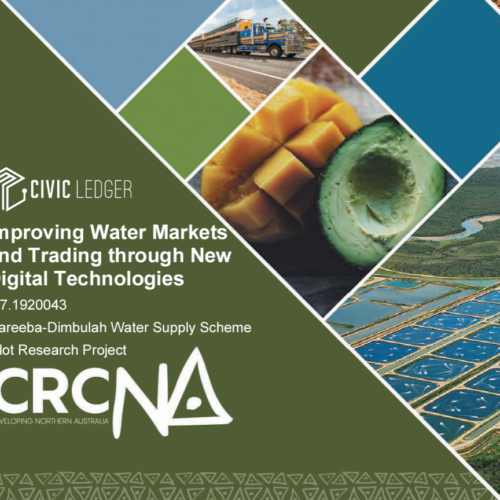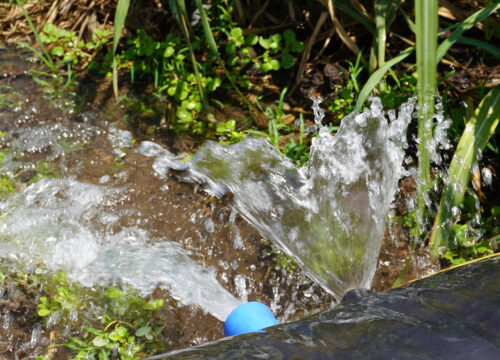
- Author Civic Ledger
- Publish date 11 December 2020
- Type Report
- ISBN 978-1-922437-21-1
- Documents
- Horticulture
- Strategic policy development
Summary
Civic Ledger’s improving water markets and trading through new digital technologies pilot project focused on agricultural irrigators operating within the Mareeba-Dimbulah Water Supply Scheme (MDWSS) on the Atherton Tablelands in Far North Queensland.
The pilot project sought to deploy and test Civic Ledger’s blockchain enabled peer-to-peer water market and trading platform, Water Ledger. The Water Ledger trading platform was adapted to the MDWSS business and operating rules to observe how blockchain technology can reduce trading costs, improve the efficiency of trade processes, and increase water market transparency.
Project participants include Far North Queensland (FNQ) Growers, Queensland Department of Natural Resources, Mines and Energy (QDNRME), Griffith University and Royal Melbourne Institute of Technology (RMIT) Blockchain Innovation Hub. SunWater supported the research and was a key stakeholder in the research collaboration.
This report provides an overview of how the pilot tested the potential of blockchain and smart contract technology to address three fundamental challenges for effective and efficient water markets:
- Reduce transaction costs,
- Real-time price discoverability
- Interoperability.
The report identifies three horizons for future work and outlines next steps for implementation. Part three of the report is written by Griffith University and includes additional investigation of the Water Ledger trading platform’s technical architecture beyond water trading and correlation or co-dependency on digital technologies such as IoT, sensors, AI, process mapping and analysis, and digital twinning.
Projects
Scaling Next Generation Water Markets in Northern Australia
This project will explore the interconnectedness between water market design and institutional governance goals to address water security and social equity issues relating to water access. It will do so by seeking to address the question: How can investor confidence be enhanced through a grower-led transformation of Northern Australia’s emerging water markets? Research leads, Civic Ledger will explore the design of next generation rules to manage future uncertainty and deliver water security across Northern Australia. It will do so by leveraging the Improving Water Markets and Trading through New Digital Technologies research, published in December 2020, and other related research to understand linkages between enabling institutions and water market design. In parallel, Civic Ledger will test the paradigm of next generation water markets at scale by moving the Mareeba-Dimbulah Water Supply Scheme (MDWSS) in the Atherton Tablelands, far north Queensland, to its blockchain-enabled water market and trading platform – Water Ledger. In doing so, MDWSS will create “a strategic research test-bed” that has applicability across Northern Australia for real time continuous water accounting and trading to evaluate and validate the linkages between transparent governance frameworks and the design of next generation water markets.
Improving water markets and trading through new digital technologies
This pilot trial project will focus on testing Civic Ledger’s blockchain Water Ledger trading platform, currently at a Minimum Viable Product Stage of its software development lifecycle. The trial project will work with horticultural irrigators within the Mareeba Dimbulah Water Supply Scheme (MDWSS) on the Atherton Tablelands in Far North Queensland. The objective to piloting Water Ledger in the Mareeba Dimbulah Water Supply Scheme (pilot project) is to research and evaluate blockchain’s potential to support and enhance the design and development of innovative water markets in Northern Australia. This objective includes evaluation of opportunities to enhance real time price discoverability, reduce trading costs, and improve liquidity of transfers to ensure water availability through the removal of information asymmetry by creating perfect water trading and market conditions. The pilot project’s trading platform will conduct trades in parallel with existing Water Information Systems used by the irrigators at MDWSS to collect data for analysis and to determine whether a smart market based on blockchain technology: Incentivises optimisation of water allocations Increases market confidence Decreases transaction costs Improves data integrity. In doing so, the pilot will provide essential data for further research to be executed to inform trading market optimisation with relevance to the growing Northern Australia agriculture industry and will provide valuable feedback for further development of the Water Ledger platform, including for platform application at a water supply scheme.



